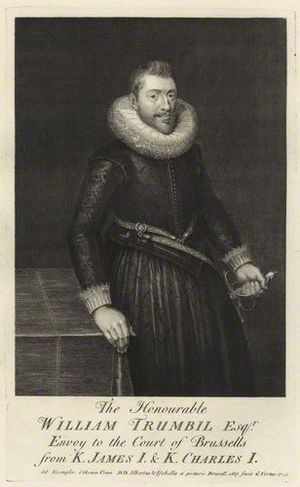William Trumbull (diplomat) facts for kids
Quick facts for kids
William Trumbull
|
|
|---|---|

William Trumbull, 1726 by George Vertue after Otto van Veen.
|
|
| Born | 1575? |
| Died | 1635 |
| Nationality | English |
| Occupation | Diplomat, administrator, politician |
William Trumbull (born around 1575, died 1635) was an important English diplomat and government worker. He also worked as a politician.
From 1605 to 1625, William Trumbull served as a secretary and then as an envoy. An envoy is like an ambassador, representing their country. He worked for King James I and later for King Charles I. His main job was at the court in Brussels, which was ruled by Archduke Albert of Austria. This area was known as the Spanish Netherlands.
William Trumbull also loved music. Around 1595, he put together his own collection of lute music. This collection is now called the Trumbull lute book. It shows that he had access to music from English court composers. These composers worked during the time of Queen Elizabeth I.
Contents
Who Was William Trumbull?
William Trumbull was the son of John Trumbull and Elizabeth Brogden. His family came from a place called Craven in Yorkshire, England.
It seems that Sir Thomas Edmondes helped him get started at the royal court. Early in King James I's rule, Trumbull worked as a court messenger. He likely joined Edmondes's group when they visited Archduke Albert of Austria in the Netherlands.
Trumbull's Diplomatic Career
When Edmondes left Brussels in 1609, Trumbull took over his role. He became the main representative for England at the Archduke's court. He stayed in this important job for sixteen years.
In 1611, he received special instructions. He had to ask for William Seymour and Arabella Stuart to be sent back to England. They were important people who had tried to escape.
In 1614, he was given a special job as a clerk to the privy council. This was a council that advised the king. Even though he had this new job, he stayed in Brussels. In 1620, he spoke out against Spain's invasion of the Palatinate.
In 1624, he asked for a future job for himself and a job for his oldest son. He was called back to England in 1625. This happened because England and Spain started a war, known as the Anglo-Spanish War.
Life After Diplomacy
On February 16, 1626, William Trumbull was chosen to be a member of parliament. He represented the area of Downton in Wiltshire. He then started working actively as a clerk of the privy council. He focused a lot on matters related to the navy.
In 1629, he was given Easthampstead Park, a large estate in Berkshire. He had to keep a deer-park there for the king to enjoy. Soon after, he became the muster-master-general. This job involved organizing soldiers.
William Trumbull passed away in London in September 1635. He was buried in Easthampstead church. A monument was built there to remember him. His godson, Edward Nicholas, took over his job as clerk to the council.
William Trumbull's Writings
William Trumbull's letters are very important for understanding the history of diplomacy during his time. Many of his letters were kept in different archives.
Some of his letters were printed in books like Ralph Winwood's Memorials and Dudley Digges's Compleat Ambassador. While he was in Brussels, Trumbull got hold of private letters. These were between Francisco de Vargas y Mexia and Cardinal Granvelle about the Council of Trent. An English translation of these letters was published in 1697 by Michael Geddes. A French translation was made in 1700 by Michel Le Vassor.
Trumbull's Family
William Trumbull and his wife, Deborah, had two sons and two daughters. Deborah was the daughter of Walter Downes from Beltring, Kent. Their older son, William (who lived from about 1594 to 1668), was the father of Sir William Trumbull.
 | Ernest Everett Just |
 | Mary Jackson |
 | Emmett Chappelle |
 | Marie Maynard Daly |

